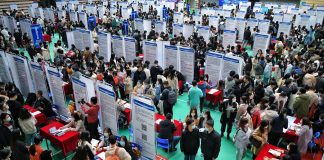New research of CIOs in Asia Pacific (APAC) by Expereo reveals that large global enterprises’ ambitions for global growth are being constrained, as close to one-third (29%) admit that they struggle to hire high-value knowledge workers that will drive forward their global expansion plans.
As the competition for talent persists, more than half (51%) of APAC CIOs believe that flexible working is crucial in retaining and attracting highly skilled employees.
Eric Wong, Head of Asia Pacific at Expereo notes, “As organisations in Asia Pacific expand their footprint globally to drive growth, they must address the complexities and obstacles involved in meeting the changing needs of a global workforce.”
“More people will now work from different locations and it’s crucial for the business to have the capability to adapt the dynamics of the network quickly to cater to diverse connectivity needs,” he said.
The competition for talent is real
The research of over 650 CIOs in global enterprises across APAC, Europe and the US reveals that skills and resource retention (35%) is currently amongst the top three barriers to their business delivering global growth, alongside challenging security environments (35%) and complicated physical and geo-political infrastructure (33%).
For CIOs in APAC, the top three barriers to delivering global growth are the usage of legacy systems (36%), lack of local knowledge (36%) and understanding at the Board level of technology challenges (36%) instead.
More specifically, finding the right mix of business and technology skills was revealed to be the most challenging thing for 42% of APAC CIOs to recruit for.
Almost a third (32%) of APAC CIOs say that finding the right competencies for their team in governance and regulatory compliance is a challenge, while expertise in growth technologies such as data analytics (44%), cyber security (43%), AI/ML (40%), and App development (40%) top the list as the most challenging skills to recruit for.
Fortunately, 44% of APAC CIOs say having a hybrid/remote policy has enabled them to hire from a wider geographical pool of talent. Interestingly, 42% of APAC CIOs say their team is now based in different countries/markets, versus the global average of 38%.
Hybrid working needs to stay, but it isn’t without challenges
The nature of work has changed, and over half (51%) of APAC CIOs believe flexible working is the key driver for retaining and recruiting the most skilled employees.
Today’s IT leaders are empowered to tap into a global pool of workers and partners to find the best talent, explaining why close to one-third of APAC CIOs (32%) have admitted to hiring someone into their team that they have never met in person.
According to the research, working three days in the office or less is now the new normal for almost three-quarters (73%) of businesses in APAC, with almost half (44%) of APAC CIOs believing the increased demand for hybrid/remote working is being driven by cost-of-living pressures.
Having said that, 29% of APAC CIOs expect to see an increase in the number of days they expect people to work from the office. According to 30% of respondents, this is due to productivity concerns with employees working from home; 30% also said home connectivity issues for their employees have a consistent impact on productivity.
The connectivity trade-off
However, the trade-off of access to more and better skilled employees is that, for many APAC CIOs, ensuring application performance across multiple locations (43%), and providing 24/7 support across multiple time zones (34%), are putting pressure on their teams.
Eric Wong continues, “The key to doing so is having the right technology in place to facilitate connectivity and collaboration in a remote working environment. Ultimately, hybrid working is all about staying connected and enabling interaction with colleagues and customers, regardless of where you are in the world.”





















